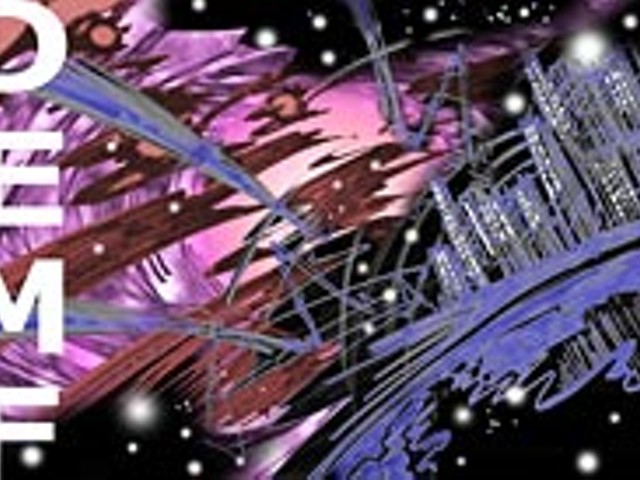The 2001 Detroit Electronic Music Festival (DEMF) will be a testament to two things: the funkiness of Carl Craig’s taste and the tenacious genius of electronic music in Detroit and beyond. Norma Jean Bell, Binary Star, Ibex, Inner City, Kelli Hand, Mike Geiger, Norm Talley, Suburban Knight, Terrence Parker and Random Noise Generation are just some of the essential Detroit acts preparing to take the stages. But the following acts illustrate how satisfying (despite the drama involved) the whole DEMF adventure continues to be.
Autechre
The best story about Autechre (England’s Sean Booth and Rob Brown) is retold in Simon Reynolds’ book, Generation Ecstasy. When England’s rave culture faced laws that even attempted to ban parties marked by “the emission of a succession of repetitive beats,” artists including Autechre purposely built tracks that defied the law and conventional wisdom in a protest. But Autechre’s growth from interesting-but-understandable dance floor intelligence to full-on twitch-glitchathon has challenged the very culture that spawned it.
Save for one underground party a number of years ago, Autechre has never played Detroit. (Saturday, 9 p.m., Bacardi Stage)
Tortoise
Enter Tortoise, American hardcore’s evolutionary answer to grunge’s closed-door, mid-’90s angst.
Tortoise explores the avants of our age — jazz, electronic, rock, hardcore, dub — with the focus of a Soviet commune. Every member of the band (which includes überproducer John McEntire) switches instruments (bass, drums, guitar, percussion, marimba, samplers, etc.) with each passing track. The group’s new record, Standards (Thrill Jockey), returns to the stripped-down rock of its earlier work without letting go of any of the fuzz and melody that the outfit has absorbed over the years. (Saturday, 8 p.m., Main Stage)
Optic Nerve wsg A Number of Names
As half of Aux 88, Keith Tucker has explored electro from end to end. But as one of the keys behind the ’90s Model 500 reunion gigs, he’s been instrumental in reminding Detroit and the world about dance music’s electro roots and live possibilities.
Now as Optic Nerve, Tucker will put on stage one of the most important acts in techno history, A Number of Names. The group’s 1980 dance hit, “Sharevari,” became one of the first definitive techno statements in the then-budding high-school party scene. Joining original members Paul Leslie and Sterling Jones, Tucker and Puzzle Box label-associate Wanda Dixon will play this weird and extremely rare hit. Afterward, Optic Nerve, with Tucker on keys and vocals, will join Will Elliot, Michael Jeffries, Ivan Sellers, Gabe Gonzalez, Bill Beavers and Marilyn White in a full-on electronic cover extravaganza, from P-Funk to Cybotron. (Sunday, 1:30 p.m., Main Stage)
Strand & Shake
In the early 1980s, if Mojo played it — whether it was white, black, electro, hip hop, New Wave, young or unknown — it was hip. As a member of Strand told me, Detroit was so cool back then that “even Young Boys Incorporated could be caught dancing to ‘Rock Lobster.’”
But not even Mojo could save Anthony “Shake” Shakir and others like him from taking shit for their musical interests. Listening to everything from Weather Report to Devo, and delving into his parents’ jazz and Motown, Shakir never quite fit in with the neighborhood crowd. So long before techno he and other outcasts of black culture got together and analyzed music by how funky it was. Period.
Fast forward 20-odd years, and Shake has joined up with Strand, DJ B. Bonds, Kech Harrington, Martin Bonds and Brian Boyer, high-school buddies and electronic peers, for a live PA. (Sunday, 9 p.m., Bacardi Stage)
Rick Wilhite
Just north of Seven Mile, on the west side of Livernois, there’s a little shop called Vibes where another 30-something Detroiter, Rick Wilhite, is making a living pushing and playing the music that still makes the dance underground move. From his own early days working at Buy-Rite Music, Wilhite has been building his skills at spinning just about anything, from techno and house to reggae and hip hop.
Like his contemporaries Theo Parrish, Kenny Dixon, and Norm Talley, the last of whom will also be at this year’s festival, Wilhite has learned that DJ genius comes with an open-minded approach and an honest sense of who your audience is. Nowadays you can find Wilhite at downtown clubs including Pure and the deep-house haven Lager House. As he tells it, “There’s no telling what I’m going do.” (Sunday, 4 p.m., CPOP Stage)
John Briggs
John Briggs explores another progressive side of Detroit electronic music, utilizing elements from industrial to jazz to create consistently challenging music. From playing with Transmat’s Tony Drake to working in bands such as Bronco Sisters and Marooned, Briggs has never fit gently into techno, house or even groove. His projects have always, in his words, “dipped into jazz roots. … Jazz is the only true alternative music, a music that is consistently an underground music.”
When Briggs conducts his live PA at this year’s festival, he’ll bring with him two percussionists, one DJ, a sax player and a guitarist. He’ll be organizing the group on keys and programming, mixing that “true alternative music” with the noisier, stranger, electronic funk that he’s used as a foundation for his whole musical life. (Monday, 1 p.m., Miller/Motor Stage)
Check out our other exclusive features on the Focus://Detroit.Electronic.Music.Festival/2001:
Pitch'd
Electric heaven
Detroit and the dance
After-party overdose





